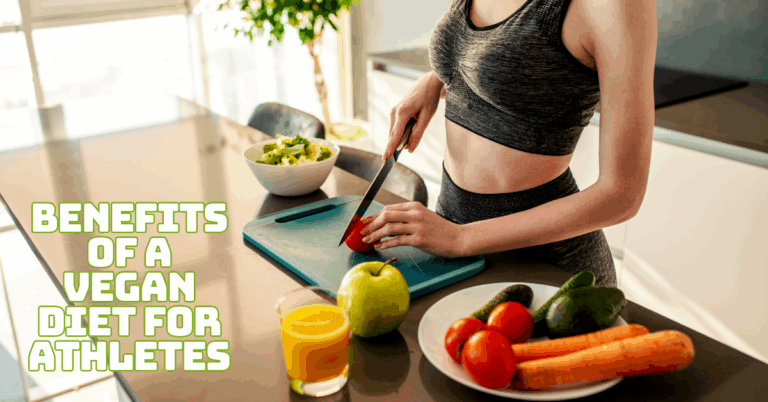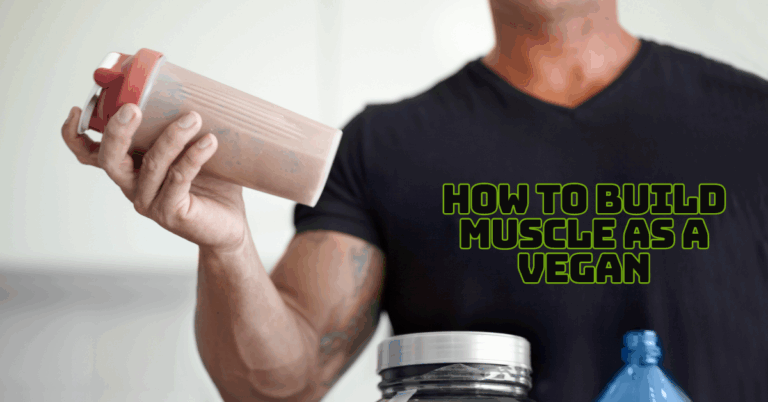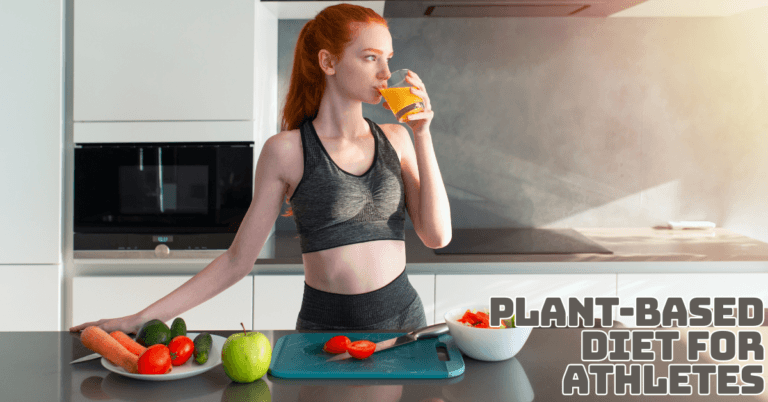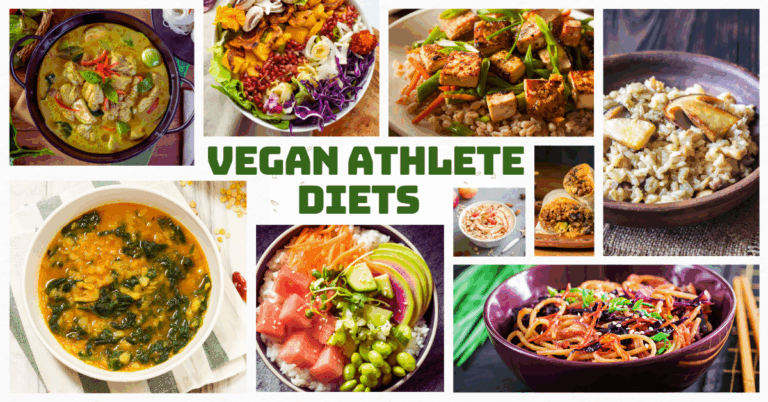Best Meal Plans For Vegan Athletes
Best Meal Plans For Vegan Athletes
Fueling the body for optimal performance is a key consideration for athletes, and the choice of diet plays a crucial role in their overall health and athletic abilities.
In recent years, veganism has gained significant popularity as a dietary choice among athletes for ethical reasons and its potential health benefits.
A vegan diet excludes all animal products, including meat, dairy, eggs, and honey, and focuses on plant-based foods rich in nutrients, antioxidants, and fiber.
In this article, we will explore the world of vegan athletes and delve into the intricacies of their meal plans.
We will uncover the benefits of a plant-based diet for athletic performance, discuss the essential nutrients to consider, and provide insights into the types of meals supporting vegan athletes in achieving their fitness goals.
So, whether you're a vegan athlete seeking inspiration or a curious enthusiast looking to understand the intersection of veganism and sports, join us to explore the realm of meal plans for vegan athletes.
Why Meal Plans For Vegan Athletes Matter
Vegan athletes have gained significant recognition in recent years due to their outstanding performances in various sports.
One crucial aspect contributing to their success is their carefully planned and balanced vegan meal plans. These meal plans are designed to provide optimal nutrition, energy, and recovery for athletes who follow a vegan lifestyle.
Here are some key reasons why meal plans for vegan athletes are important:
1. Adequate Nutrition
A well-planned vegan meal plan ensures that athletes receive all the essential nutrients their bodies need to perform at their best.
It includes a variety of plant-based foods rich in carbohydrates, proteins, healthy fats, vitamins, and minerals.
By incorporating a diverse range of plant foods, vegan athletes can meet their nutritional requirements without relying on animal products.
2. Enhance Performance
Proper nutrition is vital in optimizing athletic performance. Vegan meal plans can give athletes the necessary fuel to improve endurance, strength, and speed.
Plant-based foods such as whole grains, legumes, fruits, vegetables, nuts, and seeds are packed with complex carbohydrates, fiber, antioxidants, and phytochemicals that can enhance athletic performance and support overall health.
3. Faster Recovery
Intense physical activity stresses the body, leading to muscle damage and inflammation. Vegan meal plans rich in antioxidants and anti-inflammatory compounds can aid in reducing muscle soreness and promote faster recovery.
Foods like berries, leafy greens, turmeric, and ginger can have potent anti-inflammatory effects, supporting the body's healing process after exercise.
4. Reduce Inflammation
Animal products, particularly those high in saturated fats, have been linked to increased inflammation in the body. Chronic inflammation can hinder athletic performance and increase the risk of injuries.
Vegan meal plans, typically low in saturated fats and rich in anti-inflammatory plant foods, can help reduce inflammation and improve overall health and athletic performance.
5. Heart Health And Weight Management
Plant-based diets have reduced cardiovascular disease risk and improved weight management. Vegan meal plans naturally tend to be lower in saturated fats and cholesterol, which can contribute to better cardiovascular health.
Additionally, the high fiber content in plant-based foods promotes satiety and helps athletes maintain a healthy weight, which is crucial for optimal performance.
6. Environmental Impact
Many vegan athletes choose their dietary lifestyle not only for personal health reasons but also due to environmental and animal welfare concerns.
By following a vegan meal plan, athletes contribute to a more sustainable future by reducing their carbon footprint and minimizing the environmental impact associated with animal agriculture.
7. Digestive Health
Plant-based diets are typically fibre-rich, promoting a healthy digestive system. Adequate fiber intake can prevent digestive issues such as constipation and promote regular bowel movements.
A well-functioning digestive system is crucial for athletes as it ensures efficient nutrient absorption and optimal performance.
8. Improved Blood Flow And Oxygenation
Plant-based foods, particularly those high in nitrates, such as leafy greens and beets, have improved blood flow and oxygenation.
This can enhance athletic performance by increasing muscle oxygen, improving endurance, and reducing fatigue.
9. Mental Clarity And Focus
A well-balanced vegan meal plan with nutrient-dense foods can enhance mental clarity and focus. Certain plant-based foods, such as berries, avocados, and dark chocolate, are rich in antioxidants and compounds that support brain health.
This can positively impact cognitive function, concentration, and decision-making abilities during training and competition.
10. Ethical Considerations
Many vegan athletes make dietary choices driven by ethical considerations related to animal welfare.
These athletes align their lifestyle with their values and promote compassion towards animals by following a vegan meal plan.
This alignment can lead to greater fulfillment and purpose in their athletic pursuits.
11. Role Model And Inspiration
Vegan athletes who succeed in their respective sports can be role models and inspire others to adopt a plant-based lifestyle.
Their achievements can break stereotypes and misconceptions surrounding veganism, demonstrating that it is possible to excel athletically while following a vegan diet.
It's important to note that individual nutritional needs may vary based on age, sex, body composition, and specific sports or training goals.
Consulting with a registered dietitian or sports nutritionist specializing in vegan diets can help tailor meal plans to meet the unique requirements of each vegan athlete.
Best Meal Plans For Vegan Athletes
Meal plans for vegan athletes are designed to meet the nutritional needs of athletes who follow a vegan lifestyle, which means they abstain from consuming animal products.
These meal plans incorporate various plant-based foods to ensure athletes receive all the necessary nutrients for optimal performance, recovery, and overall health.
Section 1: The Foundations Of The Meal Plans For Vegan Athletes

1. Understanding Macronutrient Needs
Vegan athletes must carefully consider their macronutrient needs, including carbohydrates, proteins, and fats, to support their energy requirements and promote muscle recovery.
The main energy source comes from carbohydrates found in whole grains, fruits, vegetables, legumes, and other plant-based foods.
Proteins are essential for muscle repair and growth, and vegan athletes can obtain them from plant-based sources such as legumes, tofu, tempeh, and quinoa.
Healthy fats, derived from foods like avocados, nuts, seeds, and plant oils, play a role in hormone production, joint health, and nutrient absorption.
By understanding and addressing their macronutrient needs, vegan athletes can optimize their athletic performance and support their overall health.

2. Plant-Based Protein Sources
Plant-based protein sources are essential for vegan athletes, providing amino acids for muscle repair and growth.
Vegan athletes can incorporate protein-rich plant foods into their diet, including legumes (beans and lentils), tofu, tempeh, seitan, quinoa, and hemp seeds.
These plant-based protein sources offer a range of amino acids crucial for supporting muscle recovery and promoting muscle growth.
Vegan athletes can ensure they meet their protein requirements and optimize their athletic performance by including a diverse selection of plant-based protein sources in their meals.

3. Complex Carbohydrates For Sustained Energy
Complex carbohydrates provide sustained energy for vegan athletes during endurance and high-intensity workouts. Vegan athletes can obtain complex carbohydrates from various sources, including whole grains, fruits, vegetables, and starchy vegetables.
These foods supply the necessary fuel to support athletic performance and sustain energy levels throughout workouts. Whole grains such as brown rice, quinoa, and oats are excellent sources of complex carbohydrates.
Additionally, fruits and vegetables offer carbohydrates, essential vitamins, minerals, and antioxidants. By incorporating a variety of complex carbohydrates into their diet, vegan athletes can ensure they have the energy needed to excel in their athletic endeavours.

4. Healthy Fats For Optimal Performance
Including healthy fats in the diet of vegan athletes is crucial for optimal performance. Sources of healthy fats, such as avocados, nuts, seeds, and plant oils, offer numerous benefits.
These fats support joint health, aid in hormone production, and enhance nutrient absorption. Avocados provide monounsaturated fats, while nuts and seeds offer a combination of monounsaturated and polyunsaturated fats, including omega-3 fatty acids.
Plant oils like olive and flaxseed are also rich in beneficial fats. Vegan athletes can promote overall health and enhance their athletic performance by incorporating these sources of healthy fats into their meals.
Section 2: Key Nutrients for Vegan Athletes

1. Iron
Iron is an essential nutrient for vegan athletes as it supports oxygen transport in the body and helps prevent iron deficiency.
Plant-based iron sources are plentiful and include leafy greens (such as spinach and kale), lentils, beans, and fortified cereals.
These foods provide non-heme iron, which may require additional attention to optimize absorption. Consuming iron-rich plant-based foods alongside vitamin C-rich foods (such as citrus fruits or bell peppers) can enhance iron absorption.
By incorporating various plant-based iron sources into their meals, vegan athletes can ensure they meet their iron needs and support their athletic performance and overall health.

2. Calcium
Calcium is essential for vegan athletes to support bone health and muscle function. Plant-based calcium sources are abundant and include tofu, tempeh, fortified plant-based milk, leafy greens (such as collard greens and kale), and sesame seeds.
These foods provide an array of calcium that can contribute to meeting the daily calcium requirements. Adequate calcium intake is important for maintaining strong bones and ensuring proper muscle contraction and function.
Vegan athletes can incorporate these calcium-rich plant foods into their meal plans to support their athletic performance and overall health.

3. Vitamin B12
Vitamin B12 is an essential nutrient that vegan athletes must pay attention to as vegan diets may not naturally provide sufficient amounts. Vitamin B12 is crucial for nerve function and red blood cell production.
Since plant-based foods do not typically contain adequate levels of vitamin B12, vegan athletes need to consider supplementation or consume fortified foods.
Vitamin B12 supplements or fortified plant-based milk, breakfast cereals, or nutritional yeast can help vegan athletes meet their vitamin B12 needs.
Ensuring sufficient vitamin B12 intake is essential for maintaining optimal health and supporting athletic performance in vegan athletes.

4. Omega-3 Fatty Acids
Healthy fats, called omega-3 fatty acids, aid in fighting inflammation and improve brain function.
Vegan athletes can get omega-3 fatty acids from foods like flaxseed, chia seeds, walnuts, algae-based supplements, and other plant-based sources, including flaxseeds and chia seeds.
Alpha-linolenic acid (ALA), an omega-3 fatty acid, can be abundant in chia seeds and flaxseeds. ALA and other healthy fats are present in walnuts in combination.
Direct sources of EPA and DHA, the more biologically active versions of omega-3s found in fish, can be obtained in algae-based supplements like spirulina or algal oil.
Vegan athletes can ensure they get enough omega-3 fatty acids, supporting the health of their brains and controlling inflammation by including these plant-based sources in their diet or taking algae-based supplements into account.
Section 3: Meal Planning Strategies For Vegan Athletes

1. Pre-Workout Nutrition
Pre-workout nutrition is essential for vegan athletes to provide sustained energy during training sessions. Consuming a combination of carbohydrates and a moderate amount of protein is important to fuel the body and support muscle function.
Vegan athletes can consider energizing pre-workout meals or snacks that include whole grains, fruits, or vegetables for carbohydrates and plant-based protein sources such as legumes, tofu, tempeh, or plant-based protein powders.
These combinations provide the necessary fuel for sustained energy during workouts and help support muscle function. By incorporating balanced pre-workout nutrition into their routine, vegan athletes can optimize their performance and enhance their training sessions.

2. Post-Workout Recovery
Post-workout recovery is crucial for vegan athletes to replenish glycogen stores and support muscle repair. Plant-based recovery meals or smoothies rich in carbohydrates and protein can aid this process.
Carbohydrates help restore glycogen levels, while protein supports muscle repair and growth. Vegan athletes can consider incorporating plant-based carbohydrate sources like fruits, whole grains, starchy vegetables, and protein-rich foods such as legumes, tofu, tempeh, or plant-based protein powders into their post-workout meals or smoothies.
This combination helps provide the necessary nutrients for effective recovery and enhances muscle adaptation to training.
Vegan athletes can optimize their post-workout nutrition and support their athletic performance by including these plant-based recovery options in their routines.

3. Snack Choices
Snacking is important in maintaining energy levels and providing additional nutrients for vegan athletes. Choosing nutritious vegan snacks between meals is key to supporting their active lifestyle.
Healthy vegan snacks include energy balls, trail mix, fruit with nut butter, and homemade protein bars. These snacks offer a combination of carbohydrates, proteins, and healthy fats to provide sustained energy and important nutrients.
Energy balls and homemade protein bars can be made with dates, nuts, seeds, and plant-based protein powder. Trail mix can include a variety of nuts, seeds, dried fruits, and even dark chocolate.
Fruit paired with nut butter balances carbohydrates, fiber, and healthy fats. By selecting these nutritious snack options, vegan athletes can meet their energy needs, curb hunger, and fuel their bodies for optimal performance.
An Exemplary Meal Plan Designed For Vegan Athletes
Meal 1: Pre-Workout Meal
- Scrambled tofu with diced vegetables (bell peppers, onions, and spinach) cooked in olive oil.
- Whole grain toast topped with avocado slices.
- A side of fresh fruit, like berries or sliced melon.
- A glass of plant-based milk or a plant-based protein shake.
Snack
- A handful of almonds or other nuts.
- A piece of fruit, like an apple or a banana.
Meal 2: Post-Workout Meal
- Chickpea and vegetable stir-fry with quinoa or brown rice.
- Steamed broccoli or kale as a side.
- A mixed green salad with cherry tomatoes, cucumber, and a lemon-tahini dressing.
Snack
- Carrot sticks with hummus or guacamole.
- A small serving of whole grain crackers.
Meal 3: Lunch
- Lentil or black bean salad with mixed greens, diced vegetables (such as cucumbers and cherry tomatoes), and a balsamic vinaigrette dressing.
- A side of roasted sweet potatoes or quinoa.
- A handful of roasted chickpeas for added protein.
Snack
- A green smoothie made with spinach, kale, a banana, almond milk, and a scoop of plant-based protein powder.
Meal 4: Afternoon Snack
- Rice cakes or whole grain crackers topped with almond butter or sunflower seed butter.
- Sliced fruit, like strawberries or pineapple.
Meal 5: Dinner
- Grilled tempeh or tofu with steamed vegetables (such as broccoli, carrots, and snap peas) and quinoa pilaf.
- A mixed green salad with diced avocado and a light vinaigrette dressing.
Snack
- Homemade energy balls made with dates, nuts, seeds, and a touch of cocoa powder for a sweet treat.
Remember, individual nutritional needs may vary, and it's important to adjust portion sizes and ingredients based on personal requirements and preferences.
This meal plan balances carbohydrates, proteins, healthy fats, and fruits and vegetables to support an athlete's energy needs and promote overall health.
Consulting with a registered dietitian or sports nutritionist can help create a customized meal plan to meet specific goals and optimize performance.

Conclusion
In the realm of athletic performance, vegan athletes have proven that the power of plants can fuel greatness.
With careful consideration of macronutrients, plant-based protein sources, complex carbohydrates, healthy fats, and key nutrients like iron and calcium, vegan athletes can craft meal plans that meet their nutritional needs, optimize their performance, and support their overall health.
By harnessing the abundance of plant-based foods, vegan athletes can fuel their bodies with sustainable energy, promote muscle recovery and growth, and enhance their athletic endeavours.
So, whether you're sprinting, lifting, or conquering endurance challenges, remember that the world of vegan meal plans is your gateway to plant-powered excellence.
Embrace the vitality of plants and elevate your performance to new heights, one nourishing meal at a time.
I trust you enjoyed this article about the Best Meal Plans For Vegan Athletes. Please stay tuned for more blog posts to come shortly. Take care!
JeannetteZ
>>>Want To Learn How To Create Delicious, Cruelty-Free, Healthy AND 100% Vegan Meals? Try These Awesome Vegan Cooking Courses With A Free 7-DAY MEMBERSHIP<<<
Your Opinion Is Important To Me
Ideas? Thoughts? Questions? I would love to hear from you. Please leave me your questions, experience, and remarks about the Best Meal Plans For Vegan Athletes article in the comments section below. You can also reach me by email at Jeannette@LivingTheVeganLifestyle.org.
Disclosure
This post may contain affiliate links. I earn from qualifying purchases as an Amazon Associate and other affiliate programs. Please read my full disclosure.
Here are links to some of my favourite articles:
Historical Significance Of Veganism
Best Vegan Desserts Without Sugar







